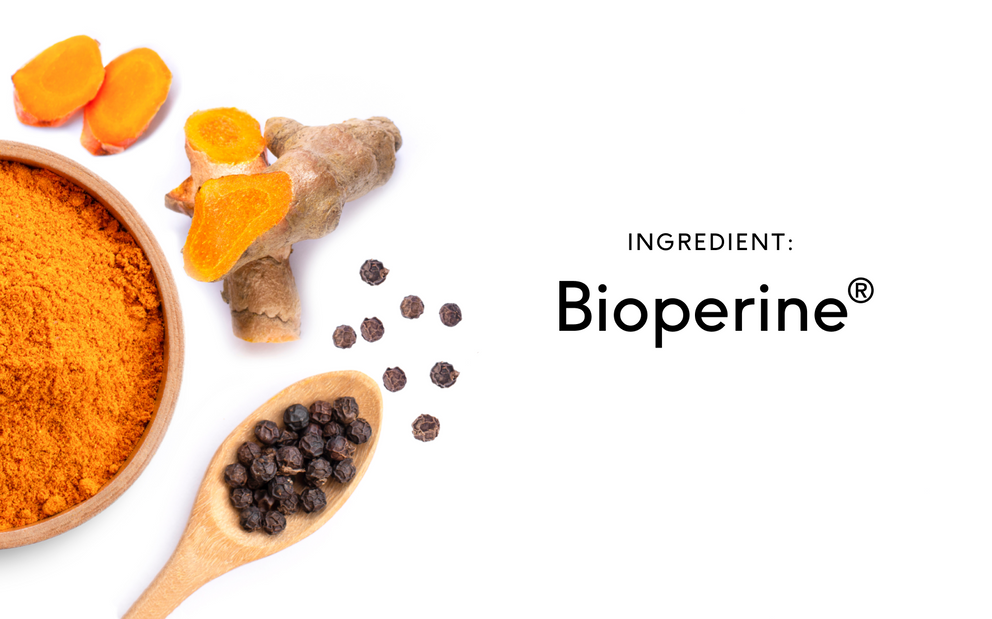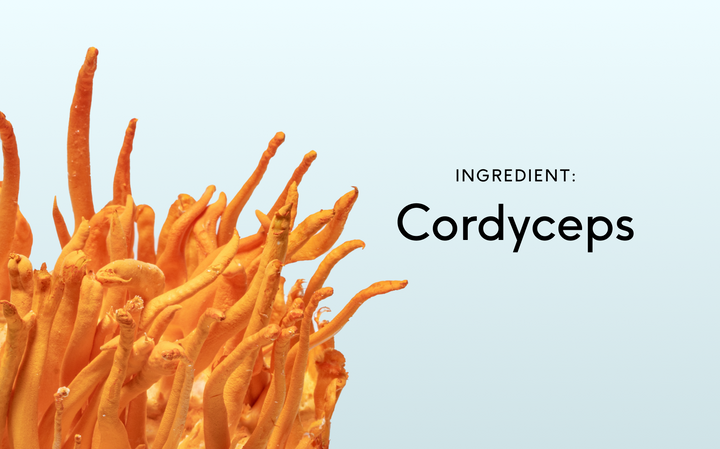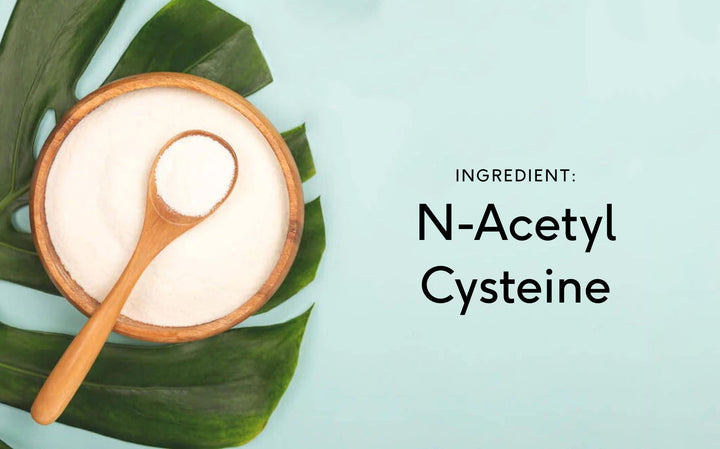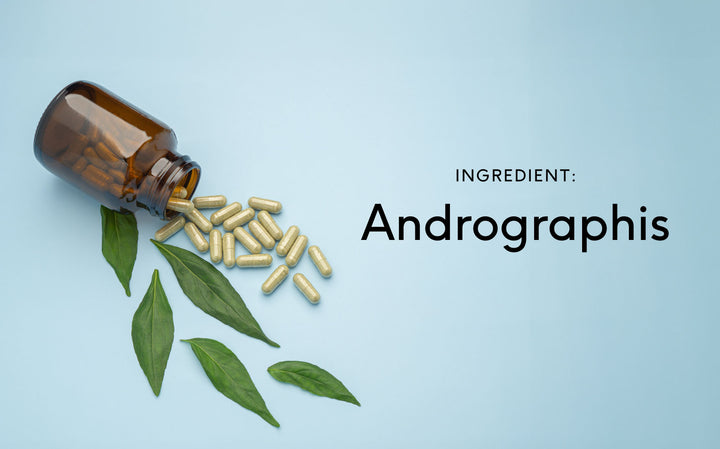Learn About Bioperine® in 5 Minutes
Table of contents

What is Bioperine®?
Bioperine® is a proprietary form of piperine, a component in black pepper that dramatically improves the bio-availability of turmeric. We include turmeric in your daily Feel Multivitamin, and optimise its absorption and utilisation within the body with the addition of Bioperine®.
- Makes it easier for your body to absorb turmeric and some of vitamins
- Improves digestion by stimulating your gastrointestinal tract
- May act as an indirect antioxidant by boosting direct antioxidant functions
- Reduces the symptoms of diabetes
This post aims to provide a comprehensive understanding of BioPerine® by answering some common questions and examining the various benefits it offers. So, sit back and learn all there is to know about this remarkable supplement in just 5 minutes.
What is BioPerine used for?
BioPerine® is a patented extract derived from black pepper fruits (Piper nigrum) and is used primarily as a bioavailability enhancer for various supplements (1). The primary active component in BioPerine® is piperine, which enhances the absorption and effectiveness of various nutrients, such as curcumin, a compound found in turmeric (2).
Benefits of Bioperine®
Digestive Benefits
A 2007 study discusses the potential digestive benefits of this substance. This study has the following to say about piperine and digestion:
“Dietary piperine, by favourably stimulating the digestive enzymes of pancreas, enhances the digestive capacity and significantly reduces the gastrointestinal food transit time.”
The pancreas is the organ that produces most of your digestive enzymes, so stimulating the pancreas would naturally improve digestion. Not only does piperine appear to reduce digestive conditions, but it appears to aid nutrient absorption in healthy people as well. Enhancing the absorption of supplements: BioPerine® increases the bioavailability of nutrients in supplements, ensuring that the body can effectively absorb and utilize them (3).
We've included 3mg of Bioperine® in our dietary supplement Feel Meal Replacement to boost your nutrient absorption, helping you to get the best out of every meal.
Diabetes Benefits
The anti-diabetes benefits of piperine appear to mostly have to do with this compound’s ability to improve the bioavailability of other substances. For instance, piperine appears to reduce the symptoms of diabetes in mice by increasing the bioavailability of metformin, and we’ve already covered how piperine’s curcumin-boosting effects drastically improve this natural substance’s antioxidant profile. BioPerine® exhibits antioxidant properties, helping to protect the body from oxidative stress (4).
Interestingly, however, piperine also appears to reduce the symptoms of diabetes on its own as long as it is administered in low doses. A 2012 study found that “subacute administration of piperine has statistically significant antihyperglycemic activity,” which means that small daily doses of piperine may help reduce blood sugar.
Supporting cognitive function: Some studies have suggested that BioPerine® may help improve cognitive function and memory (5).
Curcumin Absorption Benefits
Research into recent efforts to improve curcumin absorption found that piperine can increase curcumin tissue concentration by up to 154% for 1-2 hours. While that isn’t very long, if you consume turmeric at the same time as piperine, this natural substance will kick in just in time to deliver a huge rush of turmeric directly into your system.
If the curcumin you ingest has an adequate chance to absorb, it can provide a wide variety of highly desirable effects. In addition to pointing out that studies have shorn piperine to increase curcumin bioavailability by over 2000%, a recent review of the scientific evidence surrounding the medical benefits of curcumin found that this substance has well-demonstrated antioxidant properties that far outstrip the average.
This review goes on to point out that curcumin appears to be effective for arthritis and metabolic syndrome, and this natural substance also appears to improve the vitality of healthy people. All in all, turmeric is a highly-recommended constituent of your diet, but it’s essentially useless without piperine. Supplements that include both curcumin and piperine, such as Feel Multivitamin™ V2, deliver this amazing antioxidant substance in the exact way that it was intended to be delivered.
How long does it take BioPerine to work?
The effectiveness of BioPerine® in enhancing the absorption of nutrients can be observed within a short period. Studies have shown that the presence of BioPerine® can increase the absorption of curcumin by up to 2000% within just 45 minutes (6). This rapid action makes BioPerine® a valuable addition to various supplements, including those containing curcumin and turmeric.
What does BioPerine do for the body?
Bioperine® is the natural counterpart of turmeric. Without piperine, turmeric is almost useless, but as long as you consume plenty of bioperine, the turmeric you ingest is able to reach its full potential. Together with turmeric, bioperine exerts incredibly potent anti-inflammatory and antioxidant functions that could add years to your life. BioPerine® works by increasing the bioavailability of nutrients, which means it enhances the absorption and effectiveness of various compounds found in supplements. Here are a few ways BioPerine® impacts the body:
Improved nutrient absorption
One of the most significant benefits of BioPerine® is its ability to improve the absorption of nutrients. By increasing the bioavailability of compounds such as curcumin, turmeric, and other antioxidants, BioPerine® ensures that the body can efficiently utilize these nutrients and gain the most benefits from supplements (7).
Antioxidant support
BioPerine® exhibits antioxidant properties, helping to neutralize free radicals in the body and protect cells from damage. This antioxidant support contributes to overall health and well-being (8).
Cognitive function
Some studies have suggested that BioPerine® may help improve cognitive function and memory by enhancing the bioavailability of nutrients essential for brain health (9).
Is Bioperine® water-soluble or fat-soluble?
Piperine has traditionally suffered from low bioavailability, which reduces the efficacy of this substance’s turmeric-boosting effects. Bioperine, however, is a unique piperine formulation that is far more bioavailable than normal piperine. Bioperine boosts piperine’s water solubility, which makes it easier for your body to rapidly absorb this substance.
What is the recommended daily value for Bioperine®?
Bioperine® is not recognised as an essential nutrient, so there is no recommended daily value for this substance. When you don’t consume piperine, however, the turmeric you eat is far less bioavailable, which significantly hinders the ability of this substance to exert anti-inflammatory and antioxidant benefits.
What is the mechanism of BioPerine?
The primary mechanism of BioPerine® involves increasing the absorption of nutrients in the gastrointestinal tract. It achieves this by modulating the activity of certain enzymes and transporters responsible for the uptake of nutrients (10). This increased absorption helps to maximize the benefits of various supplements, particularly those containing curcumin and turmeric.
Where can Bioperine® be found naturally?
You can consume piperine naturally by ingesting black peppercorns or seasoning your food with the active compound ground black pepper. The amount of piperine you absorb when you use pepper for seasoning, however, is much smaller than the amount you absorb when you ingest it in bioavailable bioperine.
What is BioPerine black pepper good for?
BioPerine® black pepper extract is particularly beneficial for enhancing the bioavailability of curcumin, a powerful anti-inflammatory and antioxidant compound found in turmeric (11). By increasing the absorption of curcumin, BioPerine® black pepper extract helps to optimize the health benefits of turmeric supplements. However Black pepper is only used sparingly in Western diets, and even when you ingest black pepper, the piperine in this natural substance is not very bioavailable.
Vegans should take piperine and turmeric together to improve immunity and defend against some of the special risks posed to people who do not eat animal products.
Why we love Bioperine®
People have known about the benefits of curcumin, the active ingredient in turmeric, for quite some time now. This substance, which we’ve always included in our Feel Multivitamin™, appears to be one of the world’s most potent antioxidants, and it has a host of benefits from fighting inflammation to helping with memory.
The problem with curcumin, however, is its bioavailability. Try as they might, scientists historically haven’t been able to deliver curcumin isolate with high absorption rates, but with the dawn of bioperine, turmeric is now easy to digest.
Bioperine® is a patented formulation of piperine, which is a substance that is naturally-occurring in black pepper. This substance is what makes pepper taste spicy, and recent research into piperine indicates that this natural substance significantly improves turmeric absorption.
Piperine also has a number of unique benefits beyond improving curcumin absorption, and while research into this substance is still preliminary, we’ll cover the major benefits of piperine in this guide as part of our celebration of the new ingredients in Feel Multivitamin™.
How to take Bioperine®
You can only consume Bioperine® by consuming a supplement that contains this next-generation ingredient such as Feel Multivitamin™. You can consume raw piperine by ingesting whole black pepper grounds or enjoying ground black pepper with meals. The bioavailability of the raw piperine in black pepper, however, is far lesser than that of Bioperine®.
Conclusion
BioPerine® is a valuable addition to various supplements, thanks to its ability to increase the bioavailability of nutrients such as curcumin and turmeric. With its rapid action, antioxidant properties, and potential cognitive benefits, BioPerine® has established itself as an essential component in the world of supplements. Whether you're looking to boost the effectiveness of curcumin, turmeric, or other antioxidant supplements, incorporating BioPerine® into your regimen can lead to improved overall health and well-being.
Here’s the Proof
- Recent Developments in Delivery, Bioavailability, Absorption and Metabolism of Curcumin: the Golden Pigment from Golden Spice
- Curcumin: A Review of Its’ Effects on Human Health
- About BioPerine™
- Black pepper and its pungent principle-piperine: a review of diverse physiological effects.
- Bio-enhancing Effect of Piperine with Metformin on Lowering Blood Glucose Level in Alloxan Induced Diabetic Mice
- Evaluation of the effect of piperine per se on blood glucose level in alloxan-induced diabetic mice.
-
European Medicines Agency. (2012). Assessment report on Piper nigrum L., fructus. Retrieved from https://www.ema.europa.eu/en/documents/herbal-report/final-assessment-report-piper-nigrum-l-fructus_en.pdf
-
Antony, B., Merina, B., & Iyer, V. S. (2008). A pilot cross-over study to evaluate human oral bioavailability of BCM-95® CG (Biocurcumax™), a novel bioenhanced preparation of curcumin. Indian Journal of Pharmaceutical Sciences, 70(4), 445-449. https://www.cambridge.org/core/journals/british-journal-of-nutrition/article/abs/enhanced-bioavailability-of-curcumin-in-the-near-future/63A0B759DAA5F1F746A5F9A50ED0D76C
-
Shoba, G., Joy, D., Joseph, T., Majeed, M., Rajendran, R., & Srinivas, P. S. (1998). Influence of piperine on the pharmacokinetics of curcumin in animals and human volunteers. Planta medica, 64(04), 353-356. https://www.thieme-connect.com/products/ejournals/abstract/10.1055/s-2006-957450
-
Srinivasan, K. (2007). Black pepper and its pungent principle-piperine: a review of diverse physiological effects. Critical reviews in food science and nutrition, 47(8), 735-748. https://www.sciencedirect.com/science/article/abs/pii/S0278691509000777
-
Chonpathompikunlert, P., Wattanathorn, J., & Muchimapura, S. (2010). Piperine, the potential functional food for mood and cognitive disorders. Food and Chemical Toxicology, 48(10), 2396-2400. https://onlinelibrary.wiley.com/doi/abs/10.1002/ptr.4632
-
Shoba, G., Joy, D., Joseph, T., Majeed, M., Rajendran, R., & Srinivas, P. S. (1998). Influence of piperine on the pharmacokinetics of curcumin in animals and human volunteers. Planta medica, 64(04), 353-356. https://www.thieme-connect.com/products/ejournals/abstract/10.1055/s-2006-957450
-
DiSilvestro, R. A., Joseph, E., Zhao, S., & Bomser, J. (2012). Diverse effects of a low dose supplement of lipidated curcumin in healthy middle-aged people. Nutrition Journal, 11(1), 1-16. https://www.sciencedirect.com/science/article/pii/S0975947616300954
-
Srinivasan, K. (2007). Black pepper and its pungent principle-piperine: a review of diverse physiological effects. Critical reviews in food science and nutrition, 47(8), 735-748. https://www.sciencedirect.com/science/article/abs/pii/S0278691509000777
-
Chonpathompikunlert, P., Wattanathorn, J., & Muchimapura, S. (2010). Piperine, the potential functional food for mood and cognitive disorders. Food and Chemical Toxicology, 48(10),
-
Bhardwaj, R. K., Glaeser, H., Becquemont, L., Klotz, U., Gupta, S. K., & Fromm, M. F. (2002). Piperine, a major constituent of black pepper, inhibits human P-glycoprotein and CYP3A4. Journal of Pharmacology and Experimental Therapeutics, 302(2), 645-650. https://link.springer.com/article/10.1007%2Fs13318-013-0149-7
-
Antony, B., Merina, B., & Iyer, V. S. (2008). A pilot cross-over study to evaluate human oral bioavailability of BCM-95® CG (Biocurcumax™), a novel bioenhanced preparation of curcumin. Indian Journal of Pharmaceutical Sciences, 70(4), 445-449. https://www.cambridge.org/core/journals/british-journal-of-nutrition/article/abs/enhanced-bioavailability-of-curcumin-in-the-near-future/63A0B759DAA5F1F746A5F9A50ED0D76C
-
Srinivasan, K. (2013). Dietary spices as beneficial modulators of lipid profile in conditions of metabolic disorders and diseases. Food & function, 4(4), 503-521. https://link.springer.com/article/10.1007/s13197-013-0978-y
-
Meghwal, M., & Goswami, T. K. (2013). Piper nigrum and piperine: an update. Phytotherapy Research, 27(8), 1121-1130. https://www.ncbi.nlm.nih.gov/pmc/articles/PMC3634921/
-
Han, Y., & Li, Y. (2018). Piperine: A novel agonist of the μ-opioid receptor. European Journal of Pharmacology, 836, 33-41. https://www.sciencedirect.com/science/article/abs/pii/S0014299918307231
-
Hewlings, S. J., & Kalman, D. S. (2017). Curcumin: a review of its' effects on human health. Foods, 6(10), 92. https://www.mdpi.com/2304-8158/6/10/92










































 Back
Back





